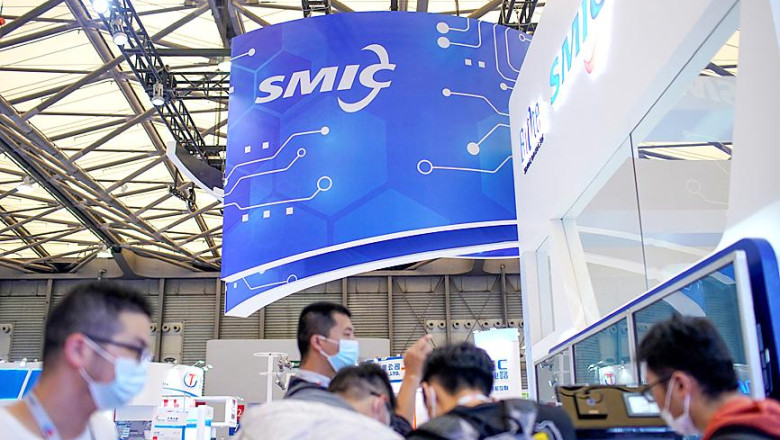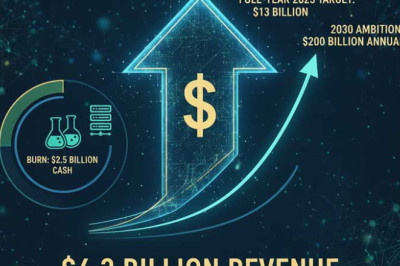
views
Semiconductor Manufacturing International Co (SMIC, 中芯) estimates a month-long lockdown in Shanghai could spur component shortages and logistics tangles, and erase about 5 percent of its output in the second quarter.
China’s biggest chipmaker has cut its outlook for the second quarter, joining a growing list of manufacturers warning about the fallout from lockdowns aimed at containing the country’s worst COVID-19 outbreak in two years.
Semiconductor Manufacturing International Co (SMIC, 中芯) estimates a month-long lockdown in Shanghai could spur component shortages and logistics tangles, and erase about 5 percent of its output in the second quarter.
“We are trying our best to mitigate the impact on product delivery,” SMIC Chairman Gao Yonggang (高永崗) told analysts on a call yesterday morning. “We are still assessing the actual impact as many suppliers restart their operation.”
Photo: Reuters
China’s “zero COVID-19” strategy, which relies on a playbook of closed borders, quarantines, lockdowns and mass testing, is upending its giant manufacturing sector even as the rest of the world lives with the virus and opens up. The impact has been particularly keen in the eastern region around Shanghai, which is struggling to contain an outbreak.
Hua Hong Semiconductor Ltd (華虹半導體), another Shanghai-based chipmaker, on Thursday also warned of potential impact from lockdowns and logistic disruptions on Thursday.
Some have bucked the trend.
SMIC jumped as much as 3.1 percent in Hong Kong yesterday after reporting profit more than doubled in the first three months, thanks to consistently strong demand for the chips used in everything from connected devices to electric vehicles.
However, the pain for manufacturers could deepen if lockdowns persist, or if global macroeconomic uncertainty undermines demand for electronics.
While factories have been given special allowances to reopen under strict guidelines and systems, snarls in the supply chain — from a shortage of delivery drivers to a lack of materials — continue to disrupt local operators and global giants, including Tesla Inc and Sony Group Corp. Apple Inc predicted that supply constraints in China would cost US$4 billion to US$8 billion in revenue this quarter.
Moreover, despite a decline in virus cases, the lockdown is intensifying as officials chase the elusive goal of wiping out COVID-19 in the community.
The local government in Shanghai said it plans to achieve “no community spread” of the virus by the middle of this month, a crucial milestone that has eluded the city, despite strict lockdown measures that have now stretched to nearly six weeks. The city of 25 million on Thursday added more than 2,000 cases and two deaths.
The COVID-19 pandemic in China, as well as the war in Ukraine, could also shave about 200 million units off global smartphone shipments this year, SMIC co-CEO Zhao Haijun (趙海軍) said on the same call.
“The majority of the amount will be shouldered by Chinese smartphone vendors,” he said.
This week’s undoing of the TerraUSD algorithmic stablecoin and its sister token, Luna, has ramifications for all of crypto. First, there is the immediate impact: The rapid collapse of a once-popular pair of cryptocurrencies sent a ripple effect across the industry, contributing to plummeting coin prices that wiped hundreds of billions of market value from the digital-asset market and stoked worries over the potential fragility of digital-asset ventures. Then there are the knock-on effects. In addition to delivering punishing losses to individual users and investment firms, the spectacular failure of a market darling like Terra threatens to have a cooling effect
China’s biggest chipmaker has cut its outlook for the second quarter, joining a growing list of manufacturers warning about the fallout from lockdowns aimed at containing the country’s worst COVID-19 outbreak in two years. Semiconductor Manufacturing International Co (SMIC, 中芯) estimates a month-long lockdown in Shanghai could spur component shortages and logistics tangles, and erase about 5 percent of its output in the second quarter. “We are trying our best to mitigate the impact on product delivery,” SMIC Chairman Gao Yonggang (高永崗) told analysts on a call yesterday morning. “We are still assessing the actual impact as many suppliers restart their
DISRUPTIONS: The war in Ukraine, China’s lockdown measures, rising interest rates and inflation have thrown a wrench into business plans made years in advance Samsung Electronics Co is talking with foundry clients about charging as much as 20 percent more for making semiconductors this year, joining an industry-wide push to hike prices to cover rising costs of materials and logistics. Contract-based chip prices are likely to rise around 15 percent to 20 percent, depending upon the level of sophistication, people familiar with the matter said. Chips produced on legacy nodes would face bigger price hikes, while new pricing would be applied from the second half of this year, they said, adding that Samsung has finished negotiating with some clients and is in discussions with others. Samsung’s decision
material SHORTAGE: Even as workers are about to return, Quanta lacks operating supplies, while Pegatron reported its lowest revenues in 11 quarters, the companies said Taiwan’s major Apple Inc supplier cut its outlook for the second quarter, joining a growing list of manufacturers warning about the fallout from lockdowns aimed at containing China’s worst COVID-19 outbreak in two years. Quanta Computer Inc (廣達電腦), which assembles MacBooks, expects a 20 percent quarterly fall in notebook shipments and a squeeze on margins this quarter due to the lockdown, a company representative said on Friday during an earnings call. The impact from supply chain disruptions could last until the end of the year, she said. The company’s Shanghai factory has been operating under tight restrictions since the middle of last month,




















Comments
0 comment